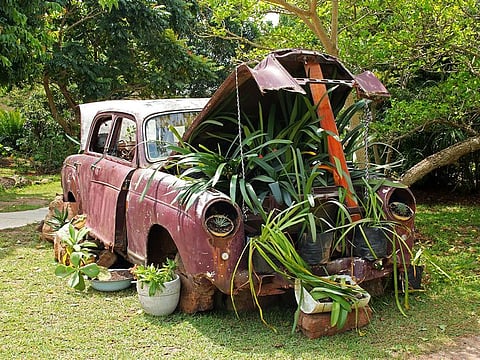You don’t know the real eco-warriors
A grandmother spent her time in Dubai retrieving pretty containers thrown by her daughter

There is much talk nowadays about being eco-conscious and aware of your carbon footprint. But my parents’ generation were true green warriors. They didn’t shout it from the roofs but lived their lives reusing and recycling everything they could. They were averse to throwing away anything and so we had chipped ceramic ware on the table and cutlery that had seen a lot of wear and tear.
If we suggested replacing these, we were subjected to a monologue on the evils of being wasteful and changing things just for the sake of change. My mother was a true green champion whose love of gardening meant she had a collection of plants that was the envy of many. But the task of finding containers was solved easily by using old utensils which she had actually decided to retire. So, there was a motley assortment of bottles, cans, bowls and kettles which were given a new lease of life as plant homes. She was not daunted by what people would say and her eclectic collection was even admired by visitors.
When you live outside India, you are often at a loss when it comes to disposing of old clothes or utensils. Here, there is a market for everything. Nothing goes to waste. There are rag pickers and scrap collectors galore. Some women vendors trade clothes for utensils, a win-win situation.
A friend of mine collects scraps of material from tailors and then employs women to make patchwork bags and pot holders. The proceeds from the sale of these go to the women who are happy to earn some extra money. And when people know the story behind these products, they are more than willing to contribute to such a cause.
In Delhi’s used electronic markets, workers reinvent discarded goods, such as laptop batteries fitted into children’s toys and mobile chargers.
Nowadays giving gifts is made easy with decorative boxes and paper bags which does away with the cumbersome task of buying gift wrapping paper and trying to wrap a gift without leaving awkward gaps or uneven edges. But in days of yore, all wrapping paper was treated with great care and you unwrapped the gift slowly to preserve the paper. The paper was folded neatly and put away for future use. Nothing went to waste. If we were impatient and tore the paper in our hurry to reveal the gift, we were scolded for our destructive ways.
Bottles were reused after their original content was consumed. In India, containers of any sort always come in handy and most housewives can recognise her possessions. For example, if one were to give a neighbour or friend a snack or cooked dish, there would be great discontent if the container was not returned or replaced by another.
In the throwaway society of today, all sorts of disposable containers are easily available but these only add to the problem of non-biodegradable waste. A circular economy addresses these problems by reducing the use of non-renewable resources as far as possible, recycling and upcycling.
I see hope in a new generation of eco-warriors who have been campaigning tirelessly for a greener planet by raising awareness on climate change or the need to do away with single-use plastic. Just look around you and you will see plastic bags and styrofoam cups strewn everywhere.
A grandmother I know spent her time in Dubai retrieving all the pretty containers thrown in the bin by her daughter, washing them and placing them in her suitcase to be taken home to India. Unfortunately for her, the daughter happened to see her suitcase as it lay open just before her departure and was appalled by what she saw as ‘rubbish’. There was a tug-of war which was won by the wily grandmother with the help of her grandchildren who stood up to their mother!
Vanaja Rao is a freelance writer based in Hyderabad, India

